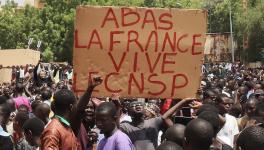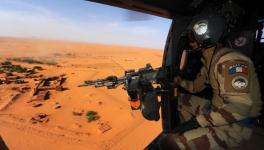Repeating The Libya Mistake in Mali
Military intervention in foreign countries always leads to unintended consequences.
These often occur in neighbor countries of the original target. One example is the Vietnam war which lead to the destabilization of and military intervention in Laos and Cambodia.
The U.S. is prone to correct such unintended consequences by further military intervention. Algeria had warned of intervention in Libya and voted against the Arab League resolution calling for a no-fly zone in Libya:
In March [2011], Algeria voted against the Arab League’s resolution calling for a no-fly zone over Libya, fearing that it would lead to the intervention of foreign ground forces and stressing the need to preserve Libya's security and territorial integrity.
In April, Algerian Foreign Minister Mourad Medelci once again expressed Algeria's fear that some forces were aiming to split Libya and that terrorists could take advantage of the resulting instability, turning the country in a major regional black market for weapons.
...
The greatest concern for Algeria is that an unstable Libya could turn into a major safe haven and source of weapons for al-Qaeda in the Islamic Maghreb (AQIM). [...] A Libyan implosion could provide AQIM with greater opportunities to buy weapons from Libyan arsenals and to expand its activities to new territories. Algerian officials have strongly stressed this point since the very beginning of the conflict. Moreover, these concerns are shared by other regional countries such as Chad, Mali and Niger.
It is obvious that the Algerian and other African governments were right in their prediction. Tuareg who had served in Gaddhafi's army took their weapons with them and revolted against the government in Mali. They were supported by newly armed AQIM forces. These are now the new rulers of northern Mali with Timbuktu as their new center.
The military intervention led, as predicted by Algeria and others, to bad unintended consequences. This should, one might think, give those who intervened some second thoughts. Could it be that Algiers was right? Could it be that military intervention creates more problems? Could it be that we should listen to those people who actually know their area?
But the people who rule in Washington and Paris are not capable of such thinking. The problems the military intervention in Libya created in Mali must, they says, now be solved by military intervention in Mali:
The United States and France have launched a diplomatic offensive to secure Algeria's vital backing for such action in Mali after the UN Security Council urged ECOWAS nations to prepare for a military force against Al-Qaeda in the Islamic Maghreb (AQIM) which is tightening its grip on the north.
This month the council called on West African nations to step up such preparations to reconquer the territory held by AQIM and other jihadist groups.
Today Hillary Clinton was in Algeria to press the Algerian government to support a war on Mali.
For about the same reasons that proved to be right with regard to Libya Algeria and other countries in the region are against such a war:
Algeria, along with Mauritania, has called for dialogue in a bid to reach a political solution, after initially ruling out sending troops. [...] [A]n Algerian Tuareg chief, MP Mahmud Guemama, spelled out why he opposed military intervention, in an interview with Elkhabar newspaper published on Monday.
"What the United States and France are asking will cause a lot of problems," he said, warning that such action had "colonial objectives."
"We are more concerned about Algerian towns in the Sahara than northern Mali," he said. "We know how military intention starts but never know the end. Libya was a good example."
Algeria will likely not provide troops for anything in Mali.
The U.S. and France are pressing and bribing several African countries to provide a much too small force of some 3,500 soldiers to somehow kick AQIM out of northern Mali, an area that is bigger than France.
But just as they are unable to learn that any intervention will inherently lead to more problems they are also incapable of learning to use the right intervention forces.
[T]he basic idea is for forces from Nigeria and other West Africa countries to help Mali’s military mount a campaign against the militants.
The use of Christian led Nigerian troops as proxy against indigenous Islamic forces in Mali will lead to the same result as the proxy use of Christian Ethiopian troops against indigenous Islamic forces in Somalia did. The Ethiopian troops there were thoroughly beaten and retreated while the original conflict intensified in brutality.
Nigeria already has problems with its own Muslim population. This have mostly social reasons but the terrorist activities of the radical Islamist Boko Haram in Nigeria will certainly increase when Nigerian troops start to fight Boko Haram's ideological AQIM friends in Mali.
It seems obvious that any intervention in Mali will only increase and spread the problem. Algeria is right to reject it. Should Nigeria really be bribed to send troops to Mali it can expect a huge blowback.
There is only a small chance that Washington, geographically far away from the area, will feel any immediate consequence of what it now tries to arrange in northern Africa. France, with a quite high migration population from northern Africa, is more likely to receive backlashes from this lunatic policies.
Get the latest reports & analysis with people's perspective on Protests, movements & deep analytical videos, discussions of the current affairs in your Telegram app. Subscribe to NewsClick's Telegram channel & get Real-Time updates on stories, as they get published on our website.
























